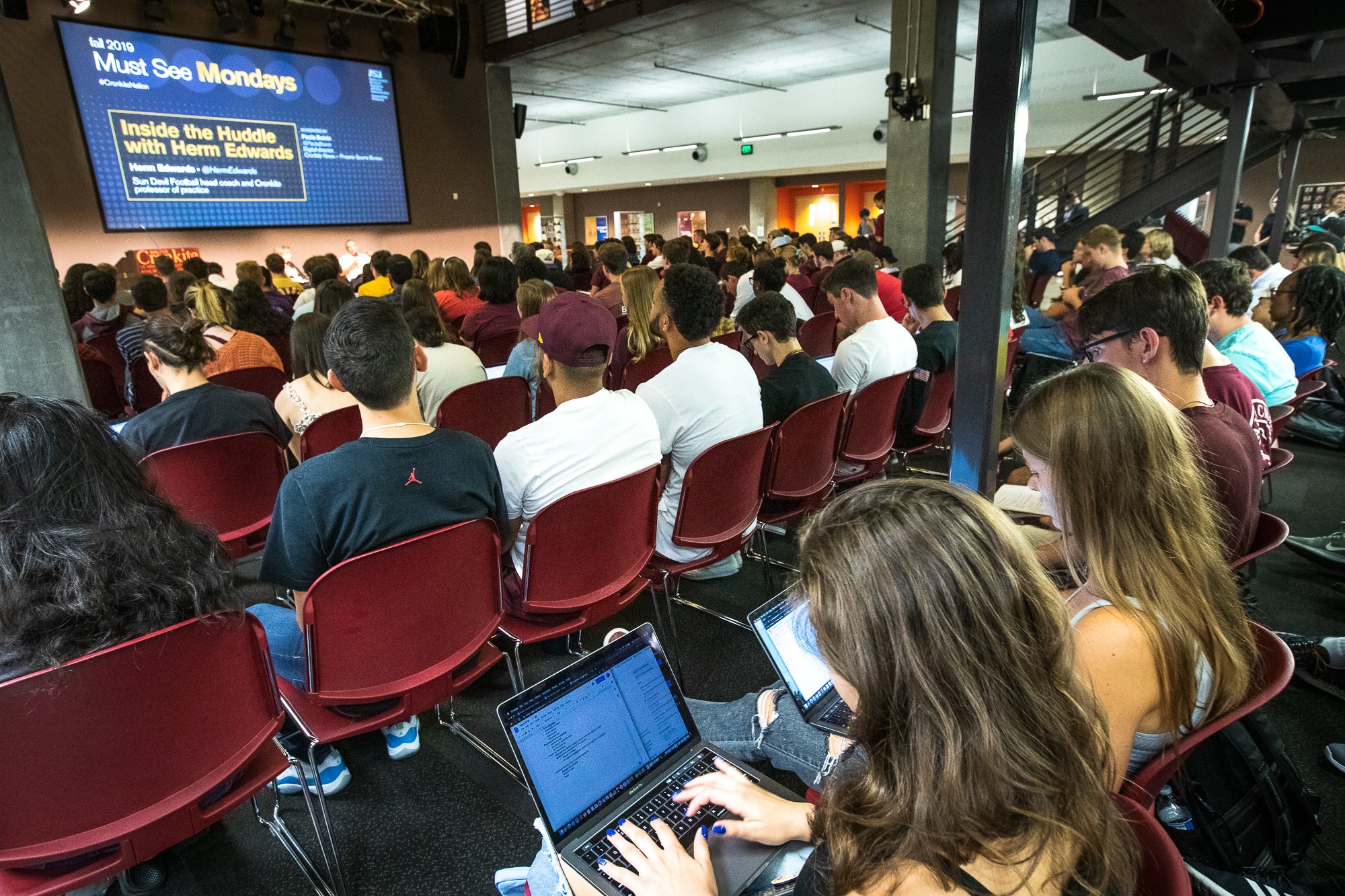Sun Devil football head coach inspires student journalists with pep talk

Arizona State University football Head Coach Herm Edwards is as comfortable in front of a microphone as he is on the gridiron. There are correlations between the two, he said.
“The thing you have to know as a coach or as a journalist is that you can’t take on someone else’s personality,” Edwards said. “At the end, you’re a storyteller. How do you get the viewer to buy into what you’re saying? There are five other channels who are saying the same thing as you, so why are they watching you? You have to tell people why. They see it, but you have to explain why. That’s knowledge.”
His talk, “Inside the Huddle with Herm Edwards,” kicked off the fall 2019 Must See Mondays speaker series at the Walter Cronkite School of Journalism and Mass Communication on ASU’s Downtown Phoenix campus.
The December 2017 hire, also a Cronkite professor of practice and former ESPN analyst, was an inspired choice for the series, said discussion moderator Paola Boivin, digital director for Cronkite News — Phoenix Sports.
“Our students can learn so much from someone who has seen journalism through a unique collection of prisms. He has been grilled by journalists in one of the toughest media markets as head coach of the New York Jets,” said Boivin, an award-winning journalist with the Arizona Republic who serves on the College Football Playoff selection committee. “He has offered thoughtful commentary as an analyst for ESPN, and has experienced the high physical and mental demands of a professional athlete. I can’t wait to listen.”
And neither could others.
Edwards’ appearance packed the Cronkite School’s First Amendment Forum with scores of journalism students, faculty, staff and community members, who loudly cheered the coach’s arrival two days after an away victory over the 18th-ranked Michigan State University Spartans. The surprise win gave the Sun Devils a recent Top 25 national ranking.
More than a hundred students packed The Cronkite School's First Amendment Forum to listen to Sun Devil football Head Coach Herm Edwards on Monday. Edwards, who is also a Cronkite professor of practice, kicked off the Must See Mondays speaker series. Photo by Charlie Leight/ASU Now
The wide-ranging interview covered Edwards’ 10-year career as a National Football League player, his tenure as an NFL scout and assistant coach, head coaching stints with the Kansas City Chiefs and New York Jets, and his post-NFL career as an ESPN analyst. He said his success is something Cronkite students could apply to their journalism careers.
“The thing that I learned a long time ago is that I didn’t want to be liked. I really didn’t want to be liked. … I wanted to be respected,” Edwards said. “When you’re liked, you’re willing to change who you are. We can’t do that. When you compromise your values, to me, you’re selling out. You don’t do that. You’ve got to stand for something.”
Edwards encouraged students to be bold in their personal and professional lives and take chances, the same as he does with his players, who aren’t afraid to discuss topics other than football.
“I tell people all the time, ‘Don’t allow people to call you an athlete. You’re a father, a husband,'” Edwards said. “'Being an athlete is your occupation. That’s what you do for a living. You’re not defined by being an athlete. Don’t let people put you in that box.’”
Edwards said his background as a former journalist is why he has made the football program accessible to the media, and views it as a symbiotic relationship.
“They (journalists) are the voice of your program, whether it’s right, wrong or indifferent," Edwards said. "You’re not going to agree with what other people write. We owe the journalists the ability to do their jobs. Our job is coaching the players.”
The 65-year-old coach said there are many correlations between football and journalism in that both professions require focus, intensity and a little anxiety.
“If you have no anxiety in your belly before that red light goes on, I’m going to tell you right now, you’re in trouble,” Edwards said. “Don’t get comfortable. Anxiety gives you a clear path of thinking.”
That said, Edwards warned that stress is more prevalent in young people today than ever before and they need to find a time and place on a daily basis to recharge their batteries, turn off all of their electronics and visually think about what they want to do in their life. It’s why Edwards shows up most days to the office at 4 a.m.
“It’s done purposely because that’s when I do all of my thinking,” Edwards said. “I get up early because it’s very quiet and no one’s bothering you. You have to have these quiet moments. You have to figure out what are your priorities … What’s important to you?”
Edwards said time marches swiftly and that when he was in college, he could never envision himself as a senior citizen.
“It (time) goes by fast and I used to hear that all the time … it goes by fast,” Edwards said. “Embrace it. Don’t question yourself. I learned this a long time ago — you have to be willing to bet on yourself, whatever you do in life. It’s going to be hard work. You fall down, you get up, but you always bet on yourself. I’ve always done that. I just bet on me.”
Edwards described himself as “a bit militant” when he was in college, someone who constantly questioned and challenged authority.
“I was a person who wanted to know why, and I think when you stop asking why, you stop seeking knowledge,” Edwards said. “You don’t quit when you’re tired, you quit when the work is done … You have to have that resolve in you.”
Top photo: Sun Devil football Head Coach Herm Edwards has a conversation with Cronkite News' Paola Boivin, in front of a packed First Amendment Forum room downtown, Monday, Sept. 16, 2019. The talk, titled "Inside the Huddle with Herm Edwards," was part of the Must See Mondays series. Photo by Charlie Leight/ASU Now
More Law, journalism and politics

Opportunities and risks of AI in the court system
“Science and innovation have always been an important part of ASU Law,” said Stacy Leeds, dean of Arizona State University’s Sandra Day O’Connor College of Law. “So when Stanford University Law…

Law and addiction: How new science is impacting the justice system
For years, people who struggle with drug addiction have often been considered weak or in need of incarceration by the general public and legal community.But with recent scientific discoveries about…

Exhibit uses rare memorabilia to illustrate evolution of US presidential campaigns
After one of the most contentious elections in history, a new museum exhibit offers a historical perspective on the centuries-old American process.“We The People! Electing the American President” had…
